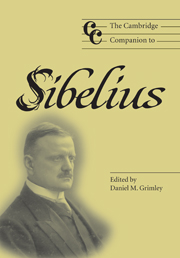Book contents
- Frontmatter
- Introduction
- Part I Forging a voice: perspectives on Sibelius's biography
- Part II Musical works
- Part III Influence and reception
- 10 Sub umbra Sibelii: Sibelius and his successors
- 11 Sibelius and Germany: Wahrhaftigkeit beyond Allnatur
- 12 Sibelius in Britain
- 13 Sibelius and contemporary music
- Part IV Interpreting Sibelius
- Notes
- Select bibliography
- Index of names and works
13 - Sibelius and contemporary music
from Part III - Influence and reception
Published online by Cambridge University Press: 28 September 2011
- Frontmatter
- Introduction
- Part I Forging a voice: perspectives on Sibelius's biography
- Part II Musical works
- Part III Influence and reception
- 10 Sub umbra Sibelii: Sibelius and his successors
- 11 Sibelius and Germany: Wahrhaftigkeit beyond Allnatur
- 12 Sibelius in Britain
- 13 Sibelius and contemporary music
- Part IV Interpreting Sibelius
- Notes
- Select bibliography
- Index of names and works
Summary
France in the 1970s
The influence of Sibelius on contemporary music is now so substantial and lasting that one can speak of him as a key figure in the shaping of current musical thought. Yet, given the disdain with which his music was treated by members of the European avant-garde following the Second World War, the growing interest in Sibelius's work amongst a younger generation of composers has been one of the least expected developments in music during the past thirty years. The presence in France of musicologists Marc Vignal, Patrick Szerznowizc and Harry Halbreich is significant here. Initially a composition student of Messiaen at the Paris Conservatoire between 1955 and 1958, Halbreich abandoned composition to become one of the most unusual and influential impresarios of the 1970s and 1980s, notably as Artistic Director of the Royan Festival in France between 1973 and 1977. His full range of enthusiasms extends to such neglected areas (in Central European terms) as the music of Vaughan Williams and Tippett. We are concerned here mainly with the manner in which he provided the crucial link for a whole generation of avant-garde composers to Sibelius, considerably altering their musical style in the process. The main French composers involved directly or indirectly include Hugues Dufourt, Tristan Murail, Pascal Dusapin, Alain Banquart and, to a lesser extent, Gérard Grisey.
- Type
- Chapter
- Information
- The Cambridge Companion to Sibelius , pp. 196 - 216Publisher: Cambridge University PressPrint publication year: 2004
- 6
- Cited by

